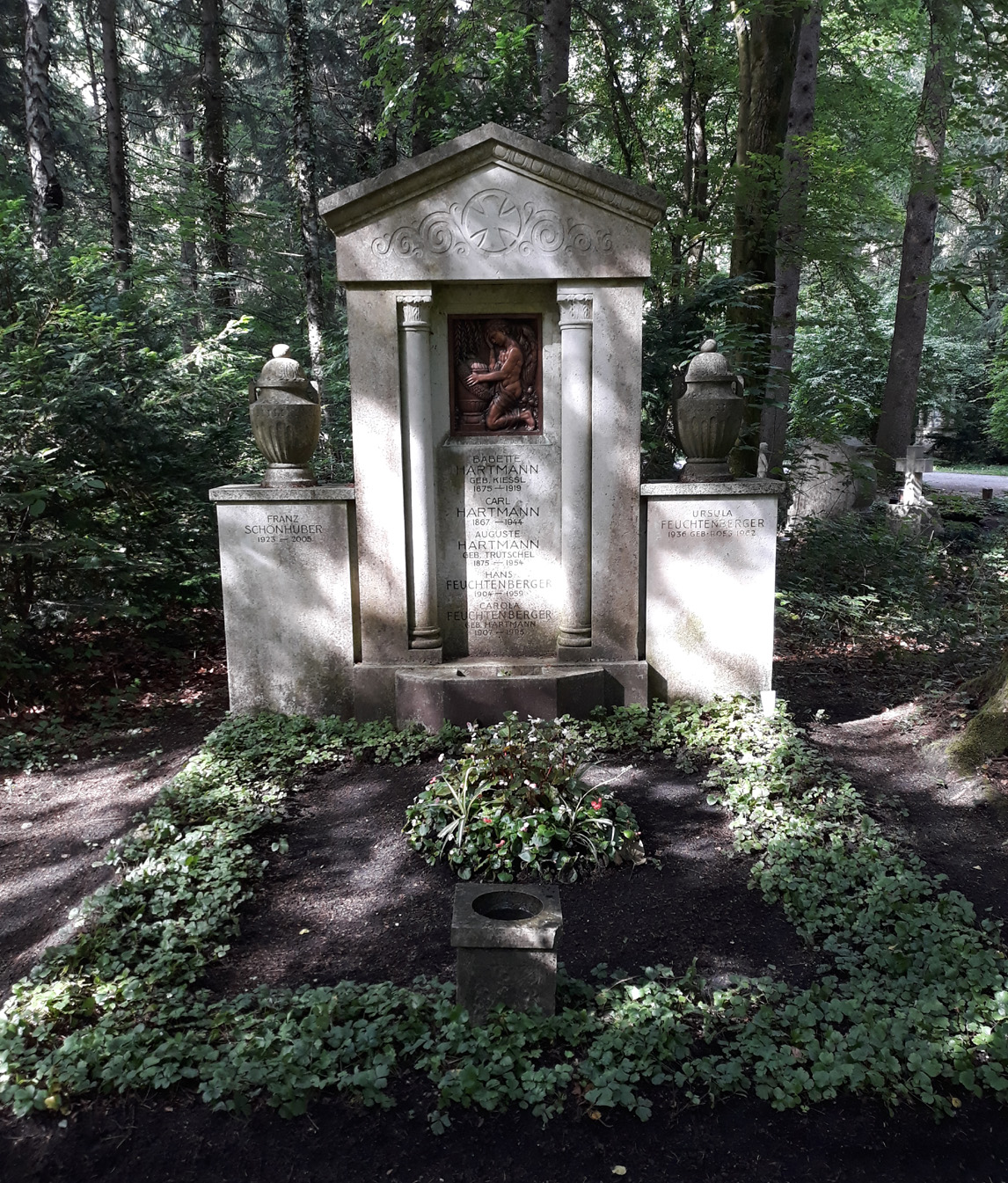Interview with Franz Xaver Schönhuber, veteran of Leibstandarte Adolf Hitler, Charlemagne and Nordland, Nuremberg, 1988.

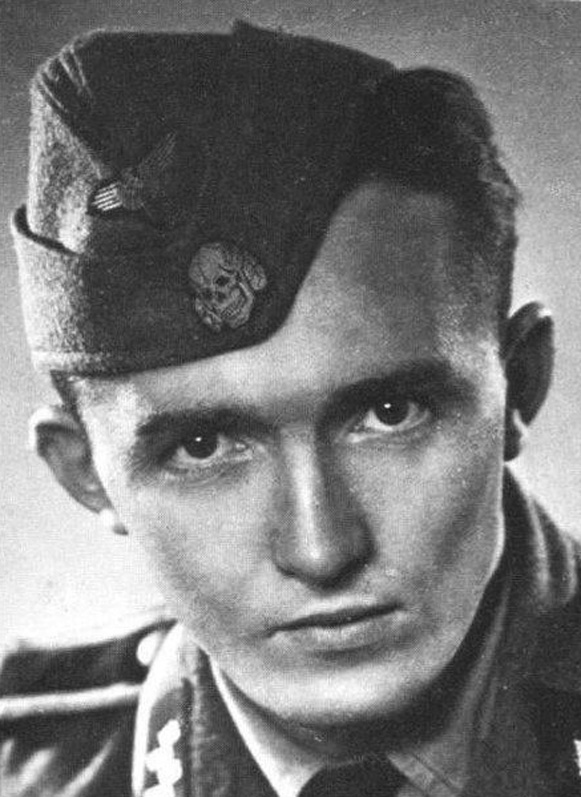

Interview with Franz Xaver Schönhuber, veteran of Leibstandarte Adolf Hitler, Charlemagne and Nordland, Nuremberg, 1988.



Franz: Yes, I am pleased to finally meet you as well, you have good company. I have published a book you must read that tells my story. To start, I was brought up to love my fatherland and the people who made up this land. It is our homeland and we alone can be responsible for it. In the HJ [Hitler Jugend, or Hitler Youth] this was a main focus point our leaders taught us. We had a saying of "everything in you, comes from your people". It was suggested to us that service to your people should be through an instrument of the highest order of loyalty, this was the SS.
The SS was the party's own armed force with loyalty to Germany, but dedicated to the Führer and his ideas. All of us wanted to enlist when war was announced, but many of us were not old enough or still had to complete RAD [Reichsarbeitsdienst, or Reich Labor Service] service first. I had a friend who was in the LAH [Leibstandarte Adolf Hitler] and it attracted me to try for the bodyguard regiment. The LAH was looked upon as the premier best of the best regiment to be in; it was very hard to get in. I did apply when I was able to, and went through the screening process, which was quite involved. There were many questionnaires, exams, and you had to speak to officers who looked for character flaws. Only the healthiest, fit, and intelligent racial Germans were taken. I was very happy when it was announced I would report for training.
[Above: Schönhuber wrote many books after the war, here is but a small selection.]
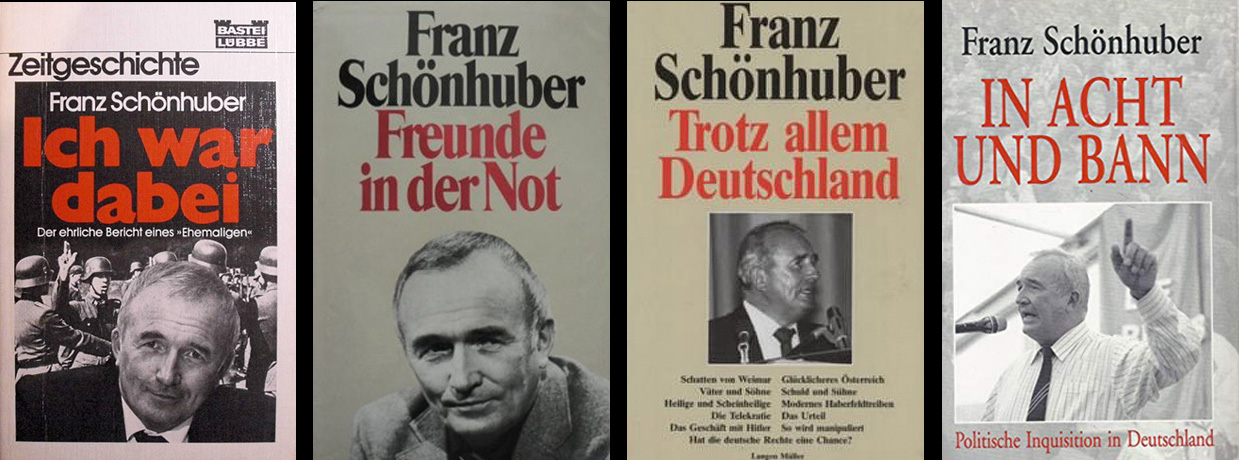
What was training like?
Franz: It was pretty much like any army really; we exercised often, marched, and drilled. The only difference was we were treated as equals, there were no class or officer privileges, we all ate together and lived together. All through training it was reinforced we are all comrades, and each man depends on the other regardless of rank. Our officers led us from the front and that's why we were so good at fighting, they always had firsthand knowledge. Our training day would start early with a call to arms, we would get into formation before the sun rose, hear roll call, march to the exercise field, then come back and make the barracks ready for inspection.
Then we formed up to hear that day's tasks, which could be drilling, weapons, or special tactics. One thing I will tell you we did not use live ammunition in exercises, as have been claimed. At the most reduced load rounds would be used to simulate live fire, and reduced load practice grenades would be used. Accidents did happen, especially later on in the war, and we needed our men alive. I remember the first time I was moving through a barbed wire course and the sound of a machine gun went off and I knew I was in the war then.
The bullets were blanks but sounded very realistic; they even threw smoke grenades at us while we crawled. Going through the water courses when it was cold was very unpleasant as well, our uniforms would be filthy, and we were cold. We would train in any weather as well, our lead instructor told us the war is fought in all weather, so you can not pick the days that are warm and nice. We did not like this, but I will say they sat us down and explained exactly why we trained for a task, and how important it was to finish it in any weather, no matter how we felt. It would later save our life and the lives of comrades as we were used to bad conditions and knew how to survive them.
After our basic training we were trained on specific areas, like Panzers, anti-tank, mechanic and so on. We would be sent to different schools for these, which were much more laid back than our first training. Here we could go out on the town on the weekends, receive visitors and attend dances and dinners hosted by the civilians. It felt more like a college campus than military base. Except we did have to maintain our bearing at all time, and never forget we wore the uniform of the Führer's SS.
We were under strict rules and codes of law that dictated our behavior. There could be no stealing, especially from civilians. One man did this, he took a watch that was not his, he was found out, and removed from the SS and sent to a penal unit in the east. We also had to watch the ladies, no relations without permission from the parents, no married women either. Another comrade was placed under arrest for an unlawful affair with the wife of an army soldier. Both received punishment. We were instructed that what we are fighting for was the women and children on the home front, if you can not trust your woman is being taken care of and faithful, what motivation did some men have left?
We also did not receive much political training, and no one pushed party membership on us. My platoon did have a low level party official in it and he was very quiet about National Socialism, and the Führer, he knew we understood what we were here for, and fighting for. We usually talked about home, hobbies, travel, the war, and of course the ladies. We had singing troupes that regularly appeared and handed out photos of the pretty girls which were very popular for the single men.
Were you allowed to go to religious services during training?
Franz: Of course, one of the biggest lies about the SS is that it was anti-religious. It was not, and was not built to be. Not all SS men and leaders were Christian; some did openly oppose religion, and made it known they did not like the Church. We had an instructor who was one of these men. He felt the Church was too Jewish and created by Jews; he let us know this all the time.
He tried to prevent trainees from attending services with the priests or pastors that were made available. We went to our commander to explain the issue and he was dealt with very nicely, it put smiles on our faces. But no, most all SS men were Christian, with a few being very vocally against the Church, but not allowed to interfere in our beliefs.
What were the relationships like with the civilians in both Germany and in the occupied areas?
Franz: It was very good I must tell you. In Germany we were the homeland's soldiers, fighting for them, so we received all sorts of stuff like food, cards, letters, and gifts. We were invited to many dances and parties in the nightclubs and dance halls, which it seemed every town had one of these where the people could go to be social.
I must say that even in the occupied areas it was not bad, not bad at all. Of course the people wished we were not there as invaders, but they got along with us well when they realized we did not come to harm them. The people who did not like us stayed to themselves, and would not speak to us, but that was not a big deal.
We had very strict rules of conduct while in an occupied country, some say stricter than at home. If you acted out of character you could get yourself in a lot of trouble. I know some SS men were placed in penal units for stealing or deceiving civilians, another was sent away for fighting while drunk. Being an SS man meant you always showed respect to the uniform and hosts by not drinking too much.
So in spite of the victors making it sound like we ran amok in occupied areas, we did not. There was very tight control to make sure the civilians saw us as liberators, and just. Even petty crime was treated severely if you were German in an occupied area. To give an example, a soldier from Nordland assaulted a Polish man who refused to give him food; this was right before the Warsaw battle. He was sent right away to the Dirlewanger Brigade who went into Warsaw, which from what I hear today was a death sentence as the home army fought very cruel.
A Polish gypsy stole a watch and wallet from a comrade who was watching a dance, and only received a fine. That was the impression that our leaders wanted to be made. It is simply just not true that the SS was behind the lines rounding up Slavs and Jews; you had to directly attack German personnel for there to be arrests and deportations.
Labor allocation is another misunderstood issue. In very small incidences, like repairing roads and such, civilians were forced to work. Most of the time they were recruited and paid well to help us, otherwise we used prisoners of war recently captured, or in nearby camps. We would need help repairing towns, roads, and living quarters so sometimes people who were unwilling were made to work.
I once saw Jews from a Russian town forced to clear rubble from an air raid and they looked happy and content, this was in late 1943. At this time we were supposed to be killing all we saw, but this is a lie. I will tell you also the Russians; especially the Ukrainians viewed German soldiers as their liberators, and treated us as such. They paid a terrible price later at the hands of the partisans who the Soviets sent into the rear to cause problems.
[Above: Schönhuber, many years after WWII, but for many loyal National Socialists the war never ended.]
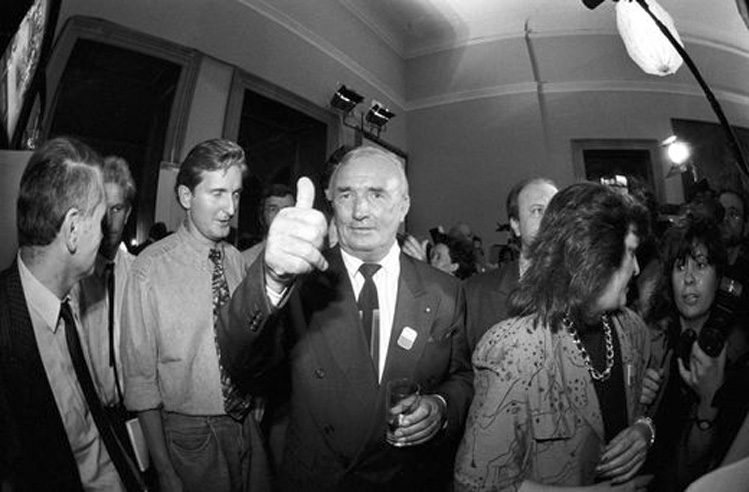
How do you explain all the stories, eyewitness testimonies, and accusations that say the SS terrorized the occupied areas, and killed many innocent people?
Franz: It is misunderstandings of the laws of war, and outright falsehoods. Most of these tales are in truth a reasonable reaction against an action. We are the losers of the war, and have very little voice on setting the record straight. A favorite tactic of the papers and authors is to grab a sick, feeble veteran and help him tell a story, of course they mold the story the way they want it, using someone who was there as proof it happened just as they say.
This is happening more and more I see, as we get older our memories fade and you become not as sharp to see the trap before you. Not all Germans were perfect angels; there were accidents of friendly fire deaths, and civilians who met a fate at the hands of fanatics who had no mercy in their hearts. But these things were so very rare, a small clique of men's actions shouldn't define us, but it does.
I can tell you that it was never our intentions, or orders to target non-military related things. Indeed we would go out of our way to take prisoners, avoid civilians, and treat them well. The few instances where SS men were accused of crimes, all have to be looked into deeper. The Allies allowed them to be convicted and punished with scant evidence presented as defenses.
Anyone can make up any story they wish. I remember hearing one, to give you an example. In Danzig, Germans lived with Poles in peace, the Poles were a minority. The HJ was allowed as well as Polish nationalist youth groups. They got along fairly well, even having meets where they played sports, or field competitions. I know this from friends who told me this, and participated. After the war, in the fifties, some of the Poles started telling stories about being harassed, beaten, raped, and homes burned, simply due to being Polish. This is a lie, which the Allied-controlled German press then ran, making it seem like the small Poles were constantly attacked. The truth is far different; they were respected and treated fair, as long as they did the same.
It would have been forbidden for any German HJ member to insult, harass, or attack anyone. These Poles lied and created a whole picture that Poles were targeted and killed. The real truth is that the Germans in Poland were the ones harassed, attacked, and killed. This is why we invaded Poland, but the media is silent on this today, even recently blaming the Germans for inciting the Poles to act against them. These lies must stop.
Many good comrades and innocent people have suffered because our enemies were driven by a hate that will not die. We had nothing to do with concentration camps, we were only combat soldiers. Yet our enemies act as if we had deep guilt with such things. I saw a few camps, and can tell you the people inside were healthy, and well cared for. It was only in the last weeks of the war that disease broke out in a few of them, resulting in the photos you see.
I will go to my grave, meet our creator, and will have no guilt of any crimes or atrocities. Most all SS men can honestly state this, as well as most all German soldiers. There may have been bad apples in a few regiments, but they were not many, and usually dealt with according to German law.
We had our own justice department in the SS which dealt with crimes of all sorts, and anyone breaking the laws of war was harshly dealt with, some getting the death penalty for unlawful acts such as looting, assault, and murder. Again this was not a common occurrence; most were very minor infractions resulting in barracks confinement or penal duties. Stealing from civilians would bring a fine of restitution and barracks confinement.
[Above: Schönhuber defended the truth about the Waffen-SS until his dying day.]
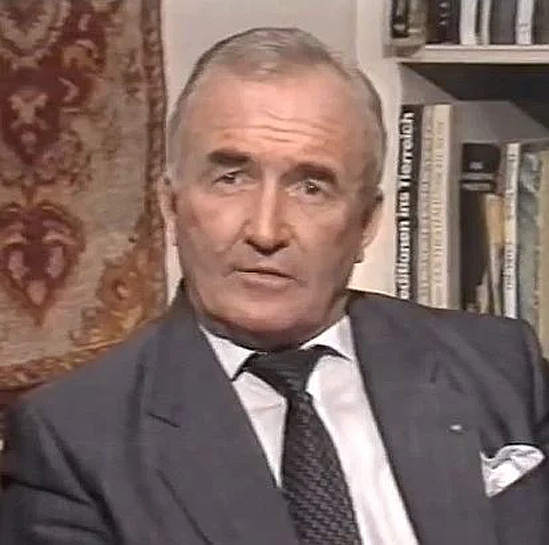
You were in some of the foreign divisions, did the men fight for Hitler and National Socialism, or was it more against communism?
Franz: Ahh, good question. I will have to say it was mixed. The German cadres usually were more of the idea we fought for Germany in a time of war. Hitler was our leader and we were loyal to him, and many understood National Socialism was a great idea that brought Germany great improvements. There were not many fanatical party members in our ranks however, some yes, but not many.
The foreign volunteers were mostly here to fight the reds, but surprisingly there were many who were National Socialists also. All European nations had a small faction in those times, and many came to us when war broke out. I will tell you many French were believers in the world order of National Socialism, and simply fought to insure a better life for their people. We all agreed that the Soviets must be defeated before that could happen.
Regardless of our differences we all stood as one and fought a threat to our world. The SS was the first time all Europeans came together to fight for a cause, putting aside all the petty quibbles of the past. It was truly a sight to see, and I am proud of my service in this army of Europe. Our enemy may have won and lied about us to justify his own crimes, but that honor of standing together will never be taken away.
Many a soldier paid with his life after surrender, simply because of his service in the SS. Many of our comrades from France were killed by [Charles] de Gaulle's forces after surrender. Even your Hemingway has recently bragged about killing a young SS soldier who he captured. Because of the hate propaganda sent out by the Allies, many SS men were shot on sight after surrender, yet history has forgotten this.
I will add and say just think about this: you are told Hitler and National Socialism are hateful of all non-Germans, yet Poles and Russians defended many German cities till the last man. French, men of the north, and others defended Berlin to the last. That should tell you something of our cause.
What inspired you to get into modern politics?
Franz: The love of my people and country. On May 8th [1945] Germany died, and so did its soul. We fought with all our hearts and souls for what we believed in, and the Allies robbed us of a better way of life. Now many have put aside their former beliefs, even distancing themselves from National Socialism to better fit in. However, with this new form of democracy, slowly but surely, the destruction of Germany is underway.
Corrupted politicians gladly aid in this, and the people are too scared or ashamed to speak up. I am being a voice for this people again and telling them there is nothing to be ashamed of, and a better world can be had by all if we turn back to the way of love of the nation and our rich culture.
I am careful to watch what I say, as we have many enemies, but we are making progress. Most all older people yearn for a return of the way it was. The young are being sucked into left wing lies which are today promoted in everything we see, TV, newspapers, magazines and so on.
They have been told to hate us, and they even protest at our reunions now, spitting on those who only defended what they loved. It is shameful, but I am given glimmers of hope as many quietly support us, and under their breath say long live the Germany of old.
[Above: A grave in the shade for a hero and patriot.]

